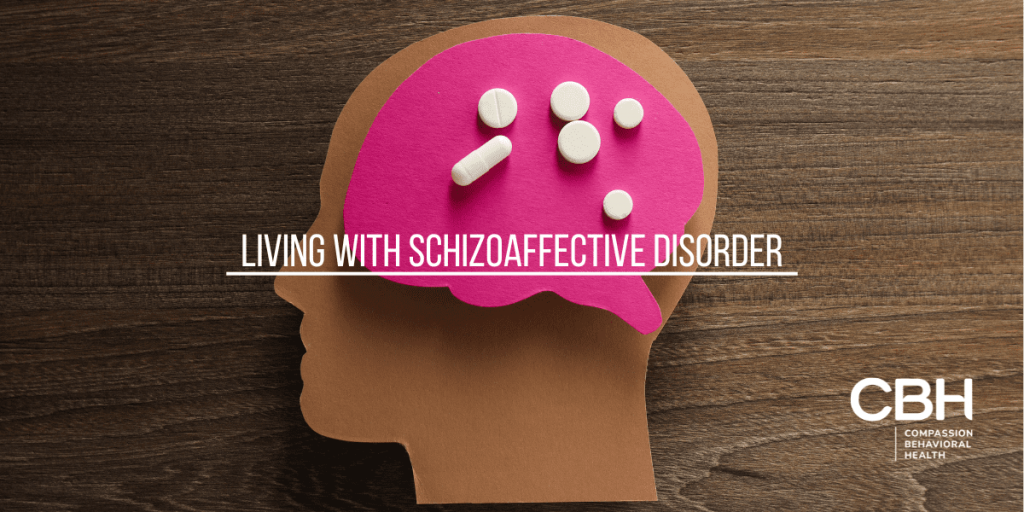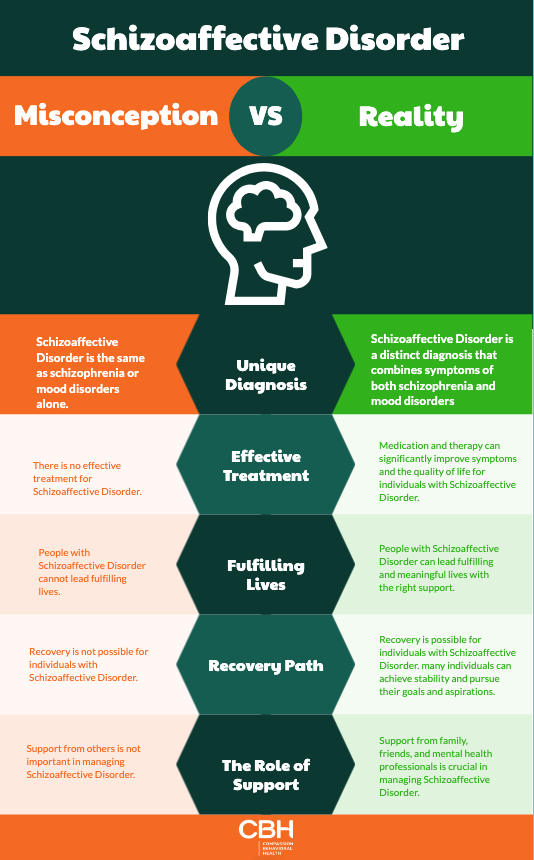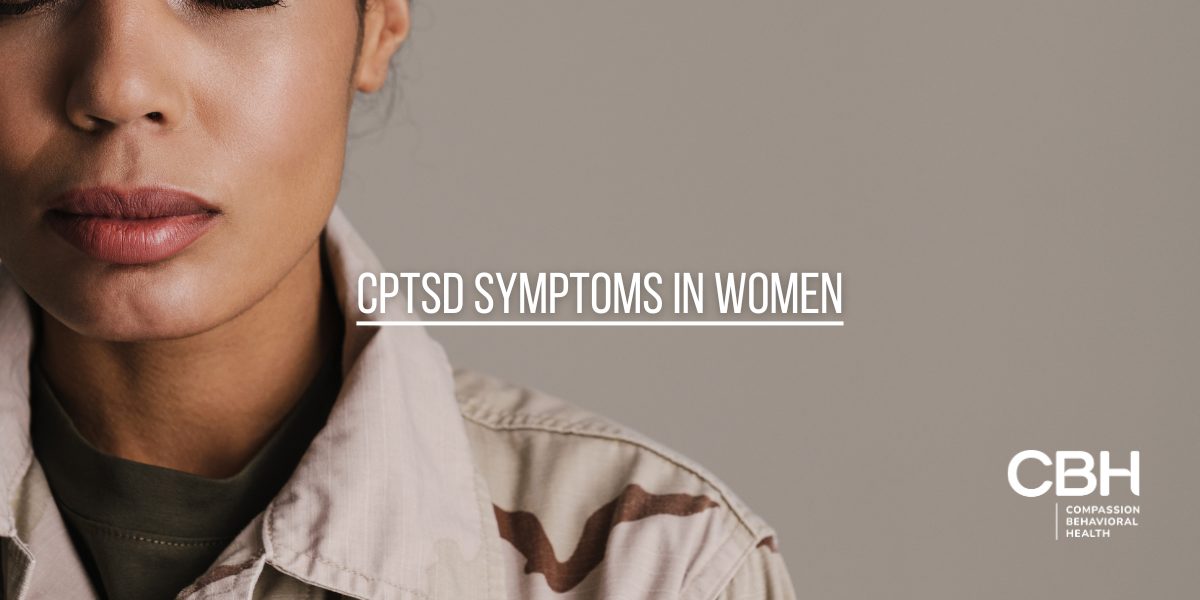Schizoaffective Disorder is a complex mental health condition that affects a person’s mood, thoughts, and behavior. While it may seem overwhelming, it is important to remember that there is hope and support available for those living with this disorder. In this article, we will explore the different aspects of Schizoaffective Disorder and provide helpful insights and coping mechanisms.
Understanding Schizoaffective Disorder
Schizoaffective Disorder is a chronic mental health condition that combines symptoms of both schizophrenia and mood disorders. It is characterized by periods of psychosis, which causes a disconnect from reality, as well as mood disturbances such as depression or mania. Understanding the intricacies of this disorder is crucial in managing its effects.
Living with Schizoaffective Disorder can be challenging, but with the right support and treatment, individuals can lead fulfilling and meaningful lives. It is important to recognize the symptoms, seek help, and dispel misconceptions surrounding this condition.
Defining Schizoaffective Disorder
Schizoaffective Disorder is a diagnosis given to individuals who experience symptoms of schizophrenia, such as hallucinations, delusions, disorganized speech, and social withdrawal, along with periods of depression or manic episodes like those seen in Bipolar Disorder. The presence of both psychotic and mood symptoms distinguishes it from other mental health conditions.
It is crucial to understand that Schizoaffective Disorder is not the same as schizophrenia or mood disorders alone. It is a unique combination of symptoms that requires a comprehensive approach to treatment.
Symptoms and Diagnosis
Recognizing the symptoms of Schizoaffective Disorder is a key step in seeking help. These may include
- changes in mood
- disorganized thinking and speech
- hallucinations
- delusions
- decreased motivation
- difficulties in concentrating
A thorough evaluation by a mental health professional is necessary to obtain an accurate diagnosis.
Diagnosing Schizoaffective Disorder can be complex as it requires careful consideration of the individual’s symptoms and history. The mental health professional will conduct a comprehensive assessment, including interviews, observations, and possibly psychological testing, to make an informed diagnosis.
Common Misconceptions
Unfortunately, there are several misconceptions surrounding Schizoaffective Disorder, which can lead to misunderstandings and stigma. It is important to dispel these misconceptions and educate others about the reality of living with this condition.
- Schizoaffective Disorder is not the same as schizophrenia or mood disorders alone. It is a distinct diagnosis that combines symptoms of both.
- Medication and therapy can significantly improve symptoms and quality of life for individuals with Schizoaffective Disorder. With the right treatment plan, many people can effectively manage their symptoms and lead fulfilling lives.
- People with Schizoaffective Disorder can lead fulfilling and meaningful lives with the right support. It is important to provide understanding, empathy, and resources to individuals living with this condition.
- Recovery is possible for individuals with Schizoaffective Disorder. While it may require ongoing treatment and support, many individuals can achieve stability and pursue their goals and aspirations.
- Support from family, friends, and mental health professionals is crucial in managing Schizoaffective Disorder. Building a strong support network can provide the necessary encouragement and assistance in navigating the challenges of this condition.
By dispelling misconceptions and increasing awareness, we can create a more inclusive and supportive society for individuals with Schizoaffective Disorder. It is essential to promote understanding and empathy, reduce stigma, and ensure that those affected have access to the resources and support they need to thrive.
The Onset: Recognizing the First Signs
Recognizing the early warning signs of Schizoaffective Disorder is crucial for early intervention and effective treatment. By being aware of these signs, individuals and their loved ones can seek medical help sooner, leading to better outcomes.
Schizoaffective Disorder is a complex mental health condition that combines symptoms of both schizophrenia and mood disorders, such as bipolar disorder or major depressive disorder. It is characterized by a combination of psychotic symptoms, such as hallucinations or delusions, and mood symptoms, such as mania or depression.
Early detection of Schizoaffective Disorder can significantly improve the prognosis and quality of life for individuals affected by this condition. Understanding the early warning signs can empower individuals and their support networks to take proactive steps towards seeking appropriate treatment.
Early Warning Signs
The early signs of Schizoaffective Disorder can vary from person to person, but common indicators include
- changes in sleep patterns
- problems with concentration
- increased social withdrawal
- difficulty expressing emotions
- experiencing unusual thoughts or beliefs
These signs may manifest gradually or suddenly, and it is important to pay attention to any significant changes in behavior or mental state.
Changes in sleep patterns can include difficulty falling asleep, staying asleep, or experiencing excessive sleepiness. Problems with concentration may be noticed as a decline in academic or work performance, as well as difficulty focusing on tasks or conversations. Increased social withdrawal can be observed as a decreased interest in social activities or a preference for solitude.
Difficulty expressing emotions can manifest as a reduced range of emotional expression or an inability to convey feelings appropriately. Individuals may appear emotionally flat or have difficulty understanding and responding to the emotions of others. Experiencing unusual thoughts or beliefs can involve having irrational or paranoid ideas, believing in supernatural powers, or feeling as if one’s thoughts are being controlled by external forces.
It is important to note that experiencing one or more of these early warning signs does not necessarily mean that a person has Schizoaffective Disorder. However, if these signs persist or worsen over time, it is advisable to seek professional help for a comprehensive evaluation.
Seeking Medical Help
If you or someone you know is experiencing symptoms of Schizoaffective Disorder, it is important to seek medical help promptly. A mental health professional, such as a psychiatrist or psychologist, can provide a comprehensive evaluation and develop a tailored treatment plan that may include medication, therapy, and support services.
Early intervention is key in managing Schizoaffective Disorder. The sooner a diagnosis is made and treatment is initiated, the better the chances of symptom control and overall recovery. Treatment approaches for Schizoaffective Disorder often involve a combination of antipsychotic medications to manage psychotic symptoms and mood stabilizers or antidepressants to address mood symptoms.
Therapy, such as cognitive-behavioral therapy (CBT) or family therapy, can also be beneficial in helping individuals cope with the challenges of Schizoaffective Disorder. Support services, such as support groups or vocational rehabilitation programs, can provide additional assistance in managing daily life and promoting overall well-being.
Remember, seeking help is not a sign of weakness, but rather a courageous step towards better mental health. If you suspect that you or someone you know may be experiencing symptoms of Schizoaffective Disorder, reach out to a healthcare professional for guidance and support.
Navigating Treatment Options
Treatment for Schizoaffective Disorder is individualized and often combines medication, therapy, and holistic approaches. By exploring the diverse options available, individuals can find strategies that work best for them.
Medication and Therapy
Medication is often an integral part of managing Schizoaffective Disorder. Antipsychotic medications can help alleviate psychotic symptoms, while mood stabilizers or antidepressants may be prescribed to address mood disturbances. Additionally, cognitive-behavioral therapy (CBT) can help individuals develop coping skills, manage stress, and improve their overall well-being.
Holistic Approaches
While medication and therapy are critical components, holistic approaches can also play a significant role in managing Schizoaffective Disorder. These may include practicing mindfulness and relaxation techniques, maintaining a healthy lifestyle through regular exercise and a balanced diet, engaging in creative outlets, and seeking support from support groups or online communities.
The Daily Battle: Coping Mechanisms
Coping with Schizoaffective Disorder can be challenging, but there are effective strategies that can help individuals navigate their daily lives and maintain their well-being.
Self-Care Strategies
Taking care of oneself is essential when living with Schizoaffective Disorder. This may involve establishing a regular sleep routine, practicing good hygiene habits, engaging in activities that bring joy and relaxation, and setting realistic goals. Prioritizing self-care can make a significant difference in managing symptoms.
Support Systems and Networks
Building a strong support system is crucial for individuals with Schizoaffective Disorder. This can include family, friends, support groups, or mental health professionals who can offer understanding, encouragement, and practical assistance. Sharing experiences and coping strategies with others who have gone through similar challenges can provide a sense of community and validation.
The Impact on Relationships
Living with Schizoaffective Disorder can have a profound impact on personal relationships. It is important to navigate these challenges and foster understanding and support from loved ones.
Personal Relationships and Schizoaffective Disorder
Family, romantic partners, and close friends often play a vital role in the recovery journey of individuals with Schizoaffective Disorder. Open and honest communication, education about the condition, and mutual support are essential in fostering strong and supportive relationships.
Building Understanding with Loved Ones
It is crucial to engage in open dialogue with loved ones to help them understand the challenges and experiences associated with Schizoaffective Disorder. Educating them about the condition, sharing personal stories, and providing resources can help reduce stigma, promote empathy, and strengthen relationships.
Conclusion
Living with Schizoaffective Disorder is undoubtedly a challenging journey. However, by gaining a comprehensive understanding of the condition, recognizing early warning signs, seeking appropriate medical help, exploring treatment options, and implementing coping mechanisms, individuals can lead fulfilling lives and manage their symptoms effectively. With the support of loved ones and a commitment to self-care, it is possible to navigate the complex terrain of Schizoaffective Disorder and embark on a personal journey of resilience and recovery.
Schizoaffective Disorder Treatment at Compassion Behavioral Health
At Compassion Behavioral Health, we understand the unique challenges presented by Schizoaffective Disorder and offer a compassionate, comprehensive approach to treatment. Our team of experienced mental health professionals is dedicated to providing personalized care that addresses both the psychotic and mood-related symptoms of the disorder. We offer a range of services, including medication management, individual and group therapy, and innovative holistic treatments designed to empower our clients.
Our goal is not just symptom management, but helping individuals rebuild their lives and achieve long-term wellness. We believe in a supportive, nurturing environment where every client is treated with respect and dignity, and where hope and recovery are at the forefront of our mission.
If you or a loved one is struggling with Schizoaffective Disorder, Compassion Behavioral Health is here to provide the support, expertise, and tailored treatment plans needed to navigate this complex condition and move towards a brighter, more fulfilling future. Call us today to learn more.




